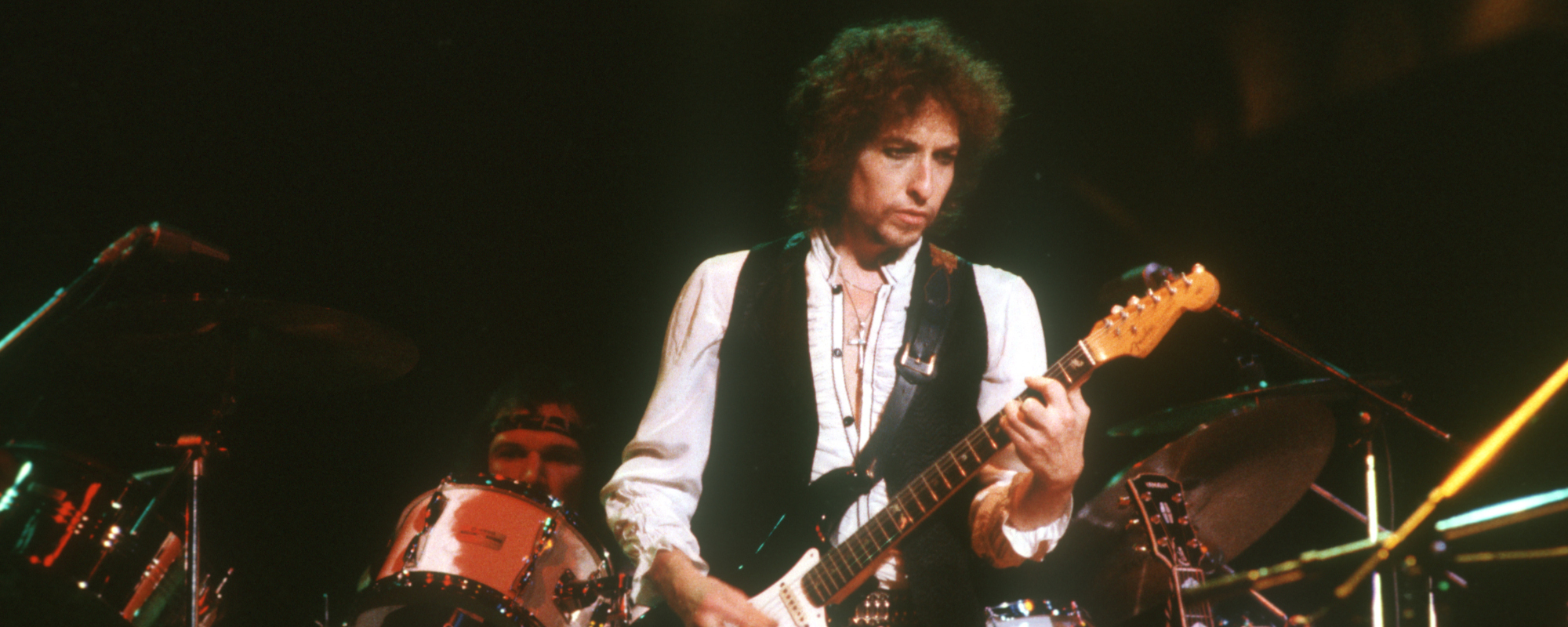This list might seem a bit crazy to the casual Bob Dylan fan. After all, why would we celebrate a guy often regarded as the best lyricist of all time with a rundown of songs where the words are barely a factor (if there are any words at all)?
Videos by American Songwriter
Well, because much like Dylan, we like to throw some curveballs at the fans from time to time. Here are five songs where Dylan doesn’t say a lot, and yet still, somehow, says so much.
“All Along the Watchtower” from John Wesley Harding (1967)
Jimi Hendrix turned this song into one of the most epic tracks of the ‘60s thanks to the chemtrails left behind by his electric guitar. But if you’ve never heard Dylan’s original, found on his 1967 album John Wesley Harding, you might be surprised at just how restrained it is. Dylan creates the strange world of “All Along the Watchtower” in just three verses that are filled with short lines. By doing so, he leaves much up to the listener’s imagination. Dylan’s version only suggests an increasing wind. Hendrix manages to conjure an entire hurricane.
“I Threw It All Away” from Nashville Skyline (1969)
Nashville Skyline was an album that was all about economy. Dylan wanted to say as much as possible with short but incisive lyrical strokes, a la one of his writing heroes, Hank Williams. For some of the album, he seems a bit constrained by the guidelines. But when he sings about heartbreak, he gets it done and then some with the minimum of verbiage. “I Threw It All Away” is one of his finest songs of regret and loss, even though it’s as plainspoken as anything that he’s ever written. Makes you wonder what kind of career he might have enjoyed had he grown up in Nashville instead of Duluth, Minnesota.
“All the Tired Horses” from Self Portrait (1970)
You have to love Dylan’s gall sometimes. On his polarizing 1970 album Self Portrait, Dylan begins with a song where he’s nowhere to be found. The vocals on “All the Tired Horses” are performed by Albertine Robinson and Maeretha Stewart. And they don’t have all that much the sing. The couplet All the tired in the horses in the sun / How’m I s’posed to get any ridin’ done? Hmm is repeated through the song, accompanied by some cinematic strings and what sounds like a harp or two. And you know what? It’s pretty compelling in a minimalist sort of way.
“Wigwam” from Self Portrait (1970)
Dylan has released a few instrumentals in his day that could have wound up on this list. We chose “Wigwam” because it’s probably the catchiest. Dylan actually provides some wordless vocals, kind of like a simpler form of scatting across the rangy melody. Originally, this was a three-piece recording, featuring Dylan and David Bromberg on guitar and the ever-present Al Kooper on piano. The brass was added after the fact to give this more of a wide-screen feel. If nothing else, Dylan seems to be having to blast in this setting, free from having to deliver any deep messages.
“Knockin’ on Heaven’s Door” from Pat Garrett & Billy the Kid (1973)
It’s always interesting to think about why certain songs make such a broad impact while others don’t. “Knockin’ on Heaven’s Door” is Dylan at his most straightforward, with minimal lyrics that are kind of pedestrian. The chorus isn’t anything that hasn’t been said similarly before. Maybe it’s the singalong quality of the thing. Or maybe it’s the copious cover versions. But when you think about it, few of Dylan’s masterpieces get anywhere near as much play as this one, which was first used to provide context for a scene of a dying cowboy in the film Pat Garrett & Billy the Kid.
When you purchase through links on our site, we may earn an affiliate commission.
Photo by Michael Ochs Archives/Getty Images












Leave a Reply
Only members can comment. Become a member. Already a member? Log in.